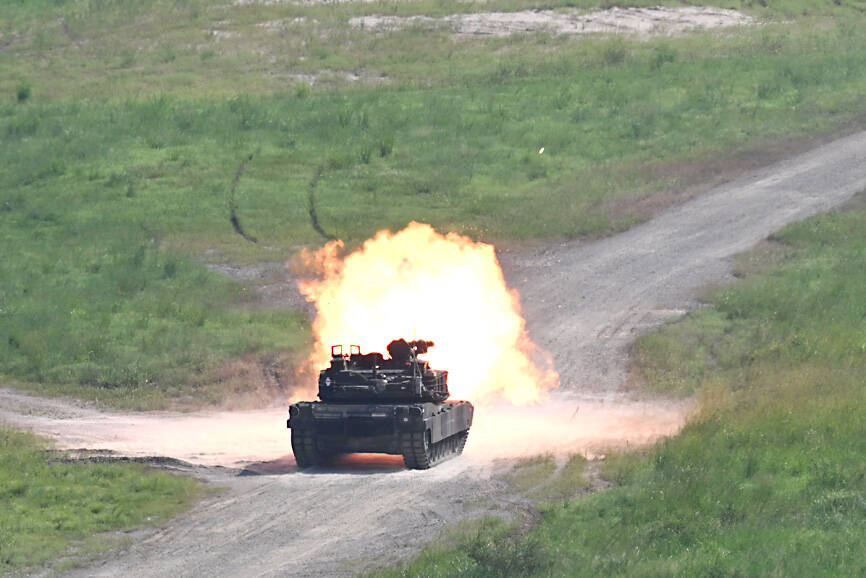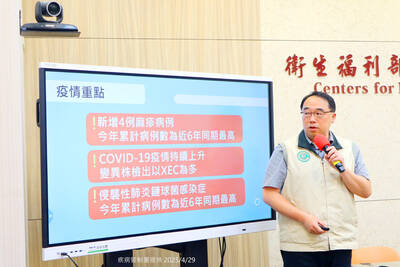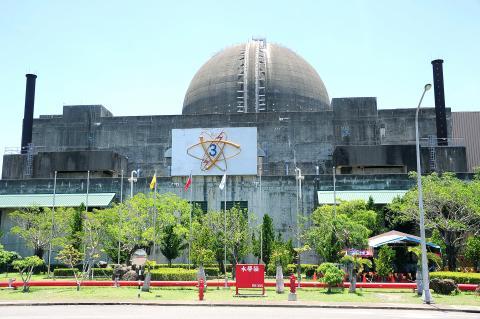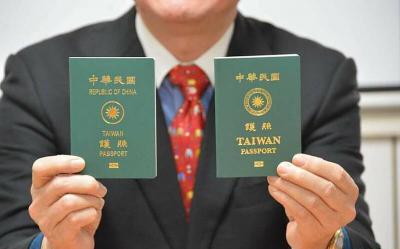The M1A2T tanks that Taiwan expects to take delivery of later this month are to spark a “qualitative leap” in the operational capabilities of the nation’s armored forces, a retired general told the Liberty Times (sister paper of the Taipei Times) in an interview published yesterday.
On Tuesday, the army in a statement said it anticipates receiving the first batch of 38 M1A2T Abrams main battle tanks from the US, out of 108 tanks ordered, in the coming weeks.
The M1 Abrams main battle tank is a generation ahead of the Taiwanese army’s US-made M60A3 and indigenously developed CM11 tanks, which have designs dating to the 1980s, retired major general Kuo Li-sheng (郭力升) said.

Photo: AFP
“Fielding the M1A2T would not only represent an increase to numerical strength, but constitute a qualitative leap,” he said.
The M1A2T is Taiwan’s best option for obtaining new tanks, as the nation is prevented from seeking an alternative source of arms, and developing an indigenous system is prohibitively expensive and time-consuming, he said.
The army has always planned to acquire M1 Abrams main battle tanks, AH-64 Apache attack helicopters and M109A6 self-propelled howitzers, a decision made in the 1990s, when the service began fielding the M60A3 and CM-11, he said.
These systems’ acquisition would mark a goalpost in the army’s effort to enhance its three-dimensional warfare capabilities, mechanization and digitization, Kuo said.
The more modern M1A2T is superior to legacy systems in firepower, mobility and protection, performance categories that make up the metrics for assessing a tank’s effectiveness, he said.
With respect to firepower, the M1A2T is more advanced than the tanks in Taiwanese service by multiple generations, Kuo said.
Most significantly, the M1A2T demonstrates “impressive target acquisition capabilities” due to being equipped with a 40-power magnification thermal imager capable of distinguishing a human face at 2km, he said.
M60A3 and CM-11 tanks are equipped with far less capable devices that have 6 to 8-power magnification, Kuo said.
An armored unit equipped with M1A2T tanks can fight with better target identification, target distribution and a lower risk of friendly fire, he added.
The M1A2T’s main armament, the 120mm smoothbore gun, boasts an effective range of more than 2km, compared with the 1.2km effective range of the M68A1’s 105mm rifled gun utilized in Taiwanese tanks, he said.
In addition, the M60A3 and CM-11 lack a muzzle reference sensor to correct the effect of thermal expansion on the gun barrel, causing a loss in accuracy after a string of seven shots, Kuo said.
The M1A2T, which is equipped with this feature, can fire every round as accurately as the first shot, he said.
The M1 Abrams family of tanks utilizes a gas turbine as their power plant, enabling a maximum speed of about 70kph, while Taiwanese army tank crews almost never drive at speeds exceeding 40kph, Kuo said.
The M60A3 and CM-11 use the chassis of the M60 Patton family of tanks, which was once excellent, but has since become old and worn out, he said.
Although Kuo did not elaborate on the M1A2T’s armor, publicly available information showed that composite armor — a design deemed significantly more effective than the steel plating of M60A3 and CM-11 — is utilized to protect the tank.
The army’s plan over the coming year is likely to use the M1A2T to replace obsolescent tanks in existing units instead of creating new armored formations, he said, adding that northern Taiwan would probably be prioritized.
The greater Taipei area is jointly defended by the army, military police and marines with about 200 main battle tanks altogether, he said, adding that replacing half that number with modern tanks would greatly strengthen defenses.
The modern tanks “would have a huge impact on the defense of our lynchpin and strategic center of gravity, as well as the conduct of combined ground defense operations as a whole,” Kuo said.
Taiwan would be highly likely to place additional orders of M1A2T tanks, as 108 vehicles represent a relatively small number compared to the nation’s fleet of nearly 1,000 tanks, Kuo said.
The Taiwan-US military exchange enabling the transfer of the tanks similarly signaled an unprecedented level of cooperation between the two nation’s armed forces, he said.
Assessments by the Taiwanese and US armed forces showed that introducing M1A2T tanks to the nation would significantly improve joint defense capabilities, Kuo said.

A fugitive in a suspected cosmetic surgery fraud case today returned to Taiwan from Canada, after being wanted for six years. Internet celebrity Su Chen-tuan (蘇陳端), known as Lady Nai Nai (貴婦奈奈), and her former boyfriend, plastic surgeon Paul Huang (黃博健), allegedly defrauded clients and friends of about NT$1 billion (US$30.66 million). Su was put on a wanted list in 2019 when she lived in Toronto, Canada, after failing to respond to subpoenas and arrest warrants from the Taipei District Prosecutors’ Office. Su arrived at Taiwan Taoyuan International Airport at 5am today on an EVA Air flight accompanied by a

COVID-19 infections have climbed for three consecutive weeks and are likely to reach another peak between next month and June, the Centers for Disease Control (CDC) said yesterday. Weekly hospital visits for the disease increased by 19 percent from the previous week, CDC Epidemic Intelligence Center Director Guo Hung-wei (郭宏偉) said. From Tuesday last week to yesterday, 21 cases of severe COVID-19 and seven deaths were confirmed, and from Sept. 1 last year to yesterday, there were 600 cases and 129 deaths, he said. From Oct. 1 last year to yesterday, 95.9 percent of the severe cases and 96.7 percent of the deaths

Restarting the No. 2 reactor at the Ma-anshan Nuclear Power Plant would take up to 18 months, Minister of Economic Affairs J.W. Kuo (郭智輝) said today. Kuo was answering questions during a meeting of the Legislative Yuan’s Economics Committee, where legislators are considering amendments to the Renewable Energy Development Act (再生能源發展條) amid concerns about the consequences of the Pingtung County reactor’s decommissioning scheduled for May 17. Its decommissioning is to mark the end of Taiwan’s nuclear power production. However, Chinese Nationalist Party (KMT) lawmakers have proposed an amendment to the Nuclear Reactor Facilities Regulation Act (核子反應器設施管制法) that would extend the life of existing

The Ministry of Foreign Affairs yesterday demanded that Somalia reverse its decision prohibiting Taiwanese passport holders from entering or transiting through the country. Somalia said it is following the “one China” principle based on UN Resolution 2758. The ministry said that Somalia is misinterpreting the resolution under China’s instigation, creating a false impression that Taiwan is subordinate to China. The Somali Civil Aviation Authority told airlines on Tuesday last week that starting today, any passengers with passports or travel documents issued from Taiwan or its affiliated institutions would not be allowed to enter or transit through Somalia. The decision comes as Taiwan is boosting